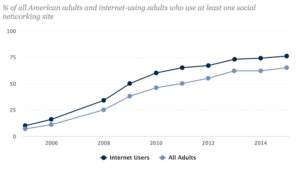Social media has seen explosive growth over the past decade.
Try to find someone without a profile and you would be hard pressed to do so.
Networks such as Facebook and Twitter make it easier than ever to stay connected with people you care about. They also allow you to stay up to date on the latest events that are trending around the world. So the rise of social media is not surprising.
According to data from the Pew Research Center, nearly two-thirds of American adults (65%) now use social on a regular basis.
Social media usage is highest among the younger demographic (ages 18 to 29) at 90%. But there has also been a huge surge in other age groups. 77% of those aged 30 and 49, and 51% between 50 to 64 report using social media. These figures are expected to rise as technology enhances accessible.
Why is this all important?
Because social media provides plastic surgery practices with the opportunity to reach even more clients. The following is a breakdown of the most common procedures by age according to the Plastic Surgery Statistics Report:
- 13 to 19: Ear surgery, nose reshaping, and breast reductions in men
- 20 to 29: Breast augmentation, liposuction, nose reshaping, and tummy tucks
- 30 to 39: Breast augmentation, breast lifts, nose reshaping, liposuction, and tummy tucks
- 40 to 54: Breast augmentation, eyelid surgery, liposuction, and tummy tucks
- 55 and older: Ear surgery, facelift, and hair transplantations
The fact that all age groups are active on networks such as Facebook, Twitter, and Google+ means that your target audience is on social media right now. Leveraging this marketing channel positions your practice’s services in front of your ideal market. This results in a major competitive advantage that ultimately brings more patients to your practice.
Other benefits of social media for plastic surgeons include:
- Deeper insight: The key to success in any industry is understanding your audience. There are no shortages of tools available (e.g. Facebook Insights) that let you analyze the demographics of your followers. This information can help you better craft your social media campaigns.
- Geo-targeting: As seen from the Plastic Surgery Statistics Report, procedures vary by age demographics. Depending on the procedures your practice offers it makes sense to target the right age group. Coincidentally, networks like Facebook and Twitter have tools that let you send out posts to certain demographics.
- Building relationships: Social media is a powerful tool for cosmetic practitioners to engage and build relationships with potential clients. This can be as simple as sharing industry updates to responding to questions about plastic surgery on Facebook or Twitter. Making these efforts can really go a long way.
Perhaps the biggest advantage of social media is the competitive edge it gives your practice.
Even with the rising popularity of Facebook and other platforms, there are many businesses that have yet to create an account. This could be due to a number of reasons from not understanding how social media works to not having the time. Simply maintaining active profiles already puts you ahead of your competitors as most are undoubtedly overlooking this marketing channel.
According to results published in an issue of Plastic and Reconstructive Surgery, only half of plastic surgeons in the U.S. use social media in their professional practice. Of those that do, approximately one-third reported a positive impact on their practice such as increased referrals and positive feedback.
The study further demonstrates the growing importance of social media for plastic surgery practices.
Conclusion
Social media usage continues to grow year after year, and it will likely continue in an upwards trend for each age demographic. Practices that leverage networks such as Facebook and Twitter have the opportunity to increase their reach, build relationships with potential patients, establish their credibility in their area of expertise, and boost their revenues. But the key to success with any marketing campaign lies in its implementation.

